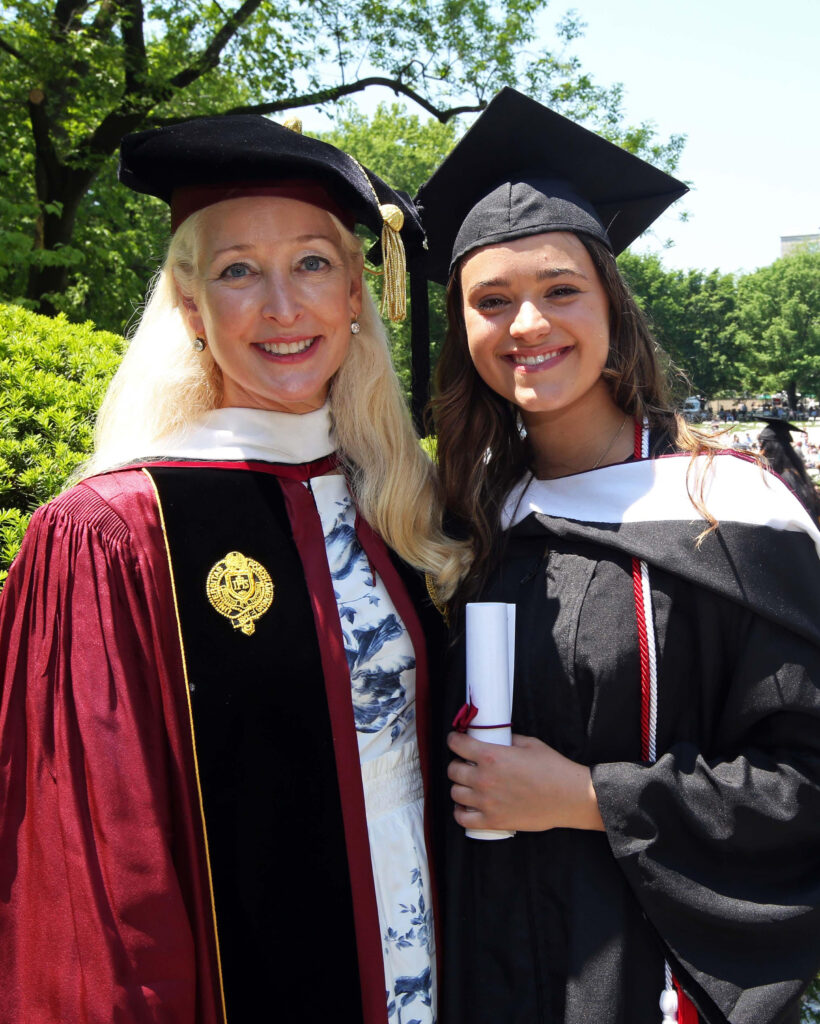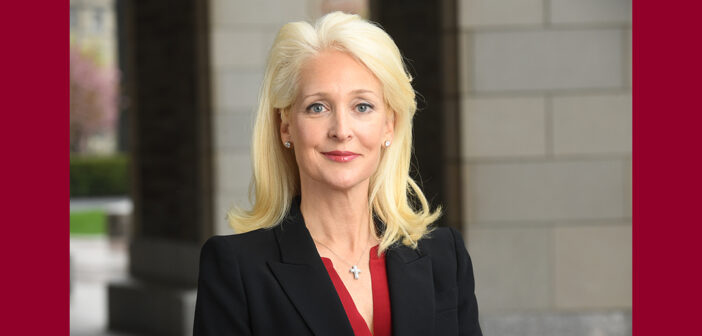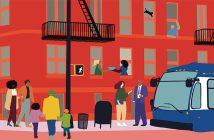What was the first day on the job like? “It was really intense, and it was very, very, intimidating. Everything was my responsibility,” she said. “There was only one judge as well.”
During this and other moments in her multifaceted career, she said, she was well served by what she had learned at Fordham—not just writing and debating skills honed in her political science classes but also the habit of seeing things through a compassionate lens. “Cura personalis is not just a phrase,” she said, referring to the Jesuit ideal of caring for the whole person. “It is throughout everything at Fordham, and it shapes you.”
In return, she came back to Fordham to help shape its future after getting her career underway. Following her graduation from Fordham College at Rose Hill, Luccio Jordan earned a law degree from Suffolk University and served as an assistant district attorney and assistant attorney general in her home state of Massachusetts. Since 2009, she has served as executive director of the Gerald R. Jordan Foundation, named for her husband, a two-time Harvard alumnus and chairman and founder of the investment firm Hellman, Jordan Management Company Inc.A philanthropic leader once described as a “rainmaker” by The Boston Globe, Luccio Jordan has given back to Fordham for 17 years as a trustee and one of the University’s most generous benefactors. A recipient of the 2012 Fordham Founder’s Award, she has been a leader in Fordham campaigns that raised funds for endowed chairs, scholarships and financial aid, and other critical needs.
Advancing Fordham Athletics
Today, she is playing a leadership role in another fundraising priority: athletics. That and scholarship giving are her focus areas as a co-chair of Cura Personalis | For Every Fordham Student, a $350 million fundraising campaign designed to enhance the entire Fordham student experience.
This is the first Fordham campaign to have athletics as a pillar. A key priority is the New Era Fund to support the basketball program, to which Luccio Jordan recently made a major gift. Last season, supported by this fund, the men’s team improved its record to 16-16 under a new head coach, Kyle Neptune, who left in April to become head men’s basketball coach at Villanova and handed off the reins to the new head coach, Keith Urgo. Next year, given the strength of the team and its staff, “there’s no reason why basketball should not put Fordham back in the spotlight, where we belong,” she said. “Some of the greatest names in sports history have been a part of Fordham’s history, and we are reclaiming our place in the sports conversation.”
Why is athletics being elevated in the University’s fundraising now, at this moment?
Athletics has long been a part of our strategic plan. Under the leadership of Father McShane [Joseph M. McShane, S.J., president of the University], Fordham has experienced tremendous growth, where we completed a comprehensive campaign that resulted in the transformation of Hughes Hall into a home for the Gabelli School of Business and new residence halls being built on the Rose Hill campus. We also completed construction of the new Fordham Law School and residence hall building at the Lincoln Center campus. We raised $175 million for student financial aid and, as you know, we have embarked on a new campaign and have recently dedicated the new McShane Campus Center. We are focusing on athletics now because we can. Since Fordham University is in a very strong place, this is the natural next step.
I think Fordham, as a community, has realized what other schools have done by embracing the additive nature of athletics and that it really is integral to the student experience. It’s complementary to the academic mission and the overall development of our students as future leaders. There’s a long list of schools—Villanova, Boston College, Georgetown, Duke—that have embraced athletics, and doing so has raised the profile of those universities. It shines a light on the institution. I just am so excited for Fordham that we are finally doing the same.
You said athletics is integral to the student experience. Can you elaborate?
In addition to the almost one-third of our student body who participate in varsity sports, club sports, and intramural teams, you have the rest of the students who benefit and participate: they work in the athletic department, they are trainers or managers for teams, they work on WFUV broadcasting the games, they are fans. It enriches not just the student-athlete; it enriches the entire community. There’s a phrase we use in athletics and in fundraising, and in particular for basketball—it’s like the front porch of the institution. You need something for people to gather around, because there is this need for people to find commonality in something that’s exciting and positive.
Can you describe the New Era Fund’s uses and the response to it?
I think people have been waiting for the men’s team to excel, and we have been able to raise money for the New Era Fund in a very short period of time. These resources are used to increase financial support for the entire basketball staff. It is really a holistic fund for the athletic department and the basketball program to use—we need more trainers, we need nutritionists, we need meals, we need foreign tour trips for both the men’s and women’s basketball teams, as well as tutors and charter flights so that less class time is missed. We have to remember they’re still students. We are asking them to represent Fordham at a level that we aspire to be at, so we need to support them. They’re learning leadership skills, they’re learning discipline, focus, physical and mental stamina, that ability to work together as a team, and there’s a lot that goes into that.
I think this past season was almost like a test case for us, because it showed what you can achieve if you’re focused, if you bring the right people together. If you support the program the way it should be supported, you can get results. It raises the excitement level, having various Fordham student-athletes highlighted as Atlantic 10 Player of the Week. Fordham started to be back in that conversation again, in a New York way.
We will also look to expand our media partnerships and footprint locally and nationally. The other important area will be to upgrade the locker rooms, office space, and training facilities to stay on par with the A-10. The improvements to the Rose Hill Gym will continue to cement its place as Fordham’s “6th man.”
How does athletics fundraising benefit the rest of the University?
My involvement with my husband’s alma mater, Harvard, and sitting on financial aid committees and campaign committees with him, taught me the importance of an integrated approach to fundraising. I wanted to replicate some of the things that happened there. Jerry would say that some of the biggest donors to Harvard were people who played a sport. They might have been swimmers, they might have been baseball players, football players, but they made gifts because of their feeling of belonging, because they were part of a team and what that felt like and how that shaped them. However, they didn’t just give to athletics—they might give to refurbish a field or build a weight center or offices or a new auditorium or gym, but they were also building science labs and endowing scholarships and professorships. More broadly, athletics benefits fundraising across the University as the success of our teams inspires and excites our Fordham communities who represent the past, the present, and, with victories on the field, a robust future “Ramily.”
Looking back on your career, do you have any advice for students?
Every task you take on, do it as well as you can, because you might use that skill again. When I was a newly installed prosecutor, after working for not even six weeks in the Norfolk County District Attorney’s office, I was told they were moving me to one of our satellite courts, which covered five different towns. They said, “You’re going to run the court.” And I said, “I don’t even know if I passed the bar yet.” My supervisor said, “Don’t worry, you’re certified. We need you out there because it’s a short-staffed courthouse.”

Darlene Jordan and her step-granddaughter, Isabelle Jordan, FCRH ’22, at Fordham’s commencement on May 21. Photo by Bruce Gilbert
So, I didn’t have a full-time secretary. I didn’t have a dedicated victim witness advocate for the victims and witnesses in my cases. It was just me. When I asked, “Why me?” they said, “Well, you’re the only one who knows how to do everything.” Because as an intern, I had worked the switchboard for the office, I had worked as a victim witness advocate, as an investigator for the various attorneys, and as a secretary. I had helped write briefs. I actually didn’t realize how prepared I was walking into the courthouse. You never know whether the job you’re currently doing is going to be necessary for the job you will be doing. I think that was a good lesson for me.
Also, being in a courthouse and being a prosecutor is a huge responsibility. I think it also taught me to treat people equitably, and with compassion, because you never know what someone’s going through.
Is there a book that had a lasting influence on you?
Yes, it’s a book called There Are No Children Here, and it describes the experience of a family, and particularly focuses on two of the brothers, who grew up in Chicago’s housing projects. It made such an impression on me, reading it when I was in the legal profession. In law school, when I worked for a domestic violence clinical lab, I accompanied women to court and helped them to obtain restraining orders, and domestic violence is a theme in the book. However, the bigger theme is what is happening in society, particularly to children in areas like this housing project, which was notorious for gangs and drugs and violence.
I think the most important part of the book is the idea that children, if given a chance, want to succeed and can succeed. And so for me, that lasting impression is the power of education. Keeping the playing field as level and as open as we can has been critically important to me and to my family. My husband went to Harvard on scholarship, and he says that if somebody did not pay for him to go to school, he wouldn’t be who he is. We’ve endowed scholarships at Harvard and at Fordham, because to us, keeping access is critical. Fordham is one of the most inclusive communities, and we need to ensure that everyone who wants a Fordham education can get one!
What are you optimistic about?
The direction of Fordham! I’ve been involved for 17 years, and over that time I’ve seen Fordham continue to excel and keep the focus on the student and the student experience. Fordham has risen in the rankings while staying true to the mission and cura personalis. So, Fordham’s direction gives me hope based upon everything else that’s going on in the world.
To inquire about giving in support of Fordham athletics or another area of the University, please contact Michael Boyd, senior associate vice president for development and university relations, at 212-636-6525 or [email protected]. Learn more about Cura Personalis | For Every Fordham Student, our campaign to reinvest in every aspect of the Fordham student experience.



